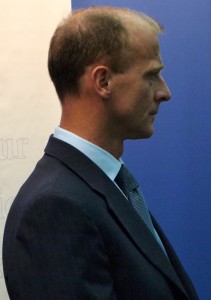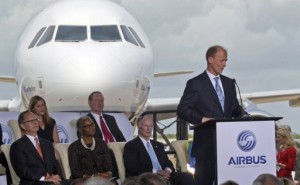2013-04-28 We asked George Talbot of the Mobile Register to expand upon his interview published at the time of the groundbreaking for the A320 facility in Mobile, Alabama.
The early piece was Mobile-specific; this piece speaks to a broader set of issues and we thank George for providing us with this article.
Tom Enders, chief executive officer of EADS, discussed the A350, the A400M and his outlook on the global defense market in an interview conducted in Mobile, Ala., where he led the groundbreaking for the company’s Airbus A320 production line.
Enders, approaching his one-year anniversary as chief executive, also shared lessons learned from the failed merger with BAE and his goals for 2013.

Question: You’ve had a busy first year as CEO. What’s on tap for year two?
Enders: Year two I hope to deliver on all the commitments we’ve made to our board and to our shareholders. We have a lot on our plate in terms of improving performance across the group. Most importantly, we must implement the new corporate governance.
That was an important fallout of the failed BAE project. We’ve made the company more normal and less political by abolishing the shareholder pact.
That is very important, positive step for the company – probably the most important change for us in our 30 years of existence.
Beyond that I’m not planning any big adventures right now. I know everybody’s expecting that.
Question: What were the lessons learned from the failed BAE merger?
We had to try it. It failed, for various reasons – chiefly political. But we gained out of that the new governance that we otherwise would not have gotten.
We basically took the governance that was designed for the merged company and applied it to EADS alone.
Without the BAE project, it’s impossible to imagine that it would have happened, especially in such a short timeline.

Question: Is the company where you’d like it to be today?
Enders: You’re never quite content. You’d like to do big steps, but you have to be realistic.
We made a big step forward in terms of normal governance. That should also help in the U.S.
It should help the (U.S.) government recognize us not just as a political, state-dominated company – which we never were, but that doesn’t matter – what matters is perception.
So now I think we can change that perception. We can prove we have the governance that is very much like U.S. aerospace companies. We have a board that is empowered to make important decisions – from strategy to major investments, on down the list.
No government will have any veto rights over the company.
I think that is a very important development.
Question: What’s your outlook for the defense market?
We’re undergoing a review on that, which I halted temporarily until I get the new board in place.
We’ll conclude that sometime in the summer.
I don’t want to jump to any conclusions here but certainly the defense business is not what it used to be.
It’s rather safe to predict that – unless the North Koreans do something crazy – defense will be flat, at best. Certainly it will be flat in Europe.
Flat, however, doesn’t mean no business. It’s still a huge market in the U.S.
The growth markets – India, Brazil, the Middle East – everybody’s trying to get in there. It’s not like they’re just waiting for you to come in and take the contracts.
Everybody has the same idea, so the competition is increasing. On top of that, it’s no longer just export.
You have to transfer international property rights, you have to transfer technology, you even have to transfer production.
The business case becomes more difficult than the traditional export case, but that’s the world we live in today.
Question: How is EADS balanced in terms of commercial vs. defense business?
Enders: All the growth we have today in the group is driven by the commercial side – Airbus and civil helicopters, both of which are positioned very well in the U.S.
And the growth rates we’re projecting for defense are very low compared to commercial.
It’s not such a bad thing to be 75 percent or more commercial at a time when defense is shrinking. If it was the other way around, we’d have a bigger problem – look at Lockheed and BAE, which are predominantly defense.
Question: What’s your outlook for the global economy?
Enders: It’s hard to say, but in our business we are optimists. I see the growth in Asia continuing. Even if it’s no longer double-digit growth, it’s still very impressive. Same for the Middle East.
I am personally very optimistic about the U.S. It would be good if they could find a way to avoid these fiscal cliffs. I’m European, so I’m not allowed to say that these political games are “stupid,” but maybe I can say they are “interesting.” Regardless there is always great potential in America.
In Europe, I think they best I can say is we’re muddling through. It’s not ideal but it’s not the worst case either. Thank God we are not dependent on European business.
So overall I’m optimistic.
Question: What’s the latest on the A400M, and could we see that aircraft produced in the U.S.?
Enders: It will be delivered for the first time this year. Then we have the advantage. On tanker, we had to say to the Air Force: If you give us the contract, we will come there and build it.
Now we’ll have more credibility because we will already be in the U.S., in Mobile.
So the A320 could be a facilitator for military business in Mobile. We’ll see. Everything is possible.
We hated to lose the tanker, but we did learn a lot from the experience and it could open the door to new opportunities.
Question: How does Mobile fit into your global strategy for EADS?
Enders: This company is on a strong path of internationalization. It started in Europe, and we’re proud of our European roots. But we’re now the 2nd largest aerospace company on the planet.
I think we have, more than any other company, the DNA for further internationalization, because we are at our very core an international company.
Don’t underestimate the difficulties of operating under the French, the German, the British and the Spanish – I think that’s made us culturally more sensitive to other countries.
The European economies inevitably will shrink, at least relative to the rest of the world. A company that wants to play in the top league needs to go global and internationalize. So Mobile is a very significant element of that strategy.
Question: What about the skeptics who say you can’t build world-class aircraft in Alabama?
Enders: Look at Tianjin. When we agreed to go there in 2005, there was a lot of skepticism in Europe and even in China.
And today, we’re delivering good quality aircraft – sometimes perhaps even better aircraft – in Tianjin than in Germany and France.
I’m sure we should get at least the same quality standard in the U.S., the homeland of aviation. Our confidence in Alabama is absolute.
Question: Will we see the A350 fly at the Paris Air Show?
Enders: That’s one you should Fabrice (Bregier, the Airbus CEO).
We’re certainly encouraged. He’s incentivized the teams to have it flying before Paris. Is that realistic? I can’t say.
For me what’s important is that the A350 flies this summer. It’s not a symbolic event, but the start of a serious test program to enable deliveries in the second half of next year.
Question: What’s your perspective on Boeing’s issues with the 787?
We have the advantage of being behind Boeing on the schedule, by a good two years or so. We’ve had the opportunity to pick up on the problems they’ve had – most recently with the battery.
You never know in the aviation business.
It’s the unexpected that usually gets you. So we never underestimate the complexity of a whole new development like the A350.
Believe me, I learned from my mistakes and the mistakes of my competitors. And you can never guarantee that you won’t have problems.
The best way to avoid such problems is not to develop new aircraft.
Question: How does the A320 NEO stack up against Boeing’s 737 MAX?
Enders: It’s a great aircraft. Actually, we didn’t take the (new engine option) decision to win more market share against Boeing.
We’re quite happy with 50-50 market share on single-aisle. We did it with the perspective of the next 20 years.
We had a particular concern about the up-and-coming competition – the Canadians, the Chinese, the Russians. We needed to keep these new competitors at bay. At the same time, we also needed to begin developing a successor to the A320.
You know, from time to time you must develop new planes. Unfortunately, it’s unavoidable in this business.
I’m sure Boeing is a little bit nervous about the A320 NEO. What was important about that for us was, for the first time, we took the initiative. We’ve always been a follower.
We were for many years the new kid on the block. We would watch Boeing, let them take initiative and then we followed. Even with the A380 – that was a response to the 747.
With the NEO, we fired the first shot. And I would say it’s always better to act than react.
For a look at Enders perspective on the challenges in the aerospace industry see the following:
https://sldinfo.com/meeting-tomorrows-aerospace-challenges/
For a look at the opening of the Spirit plant in North Carolina to support the A350 program see the following:
And for a look at the A380 see the following:
https://sldinfo.com/flying-on-the-a380-a-retrospective-on-making-a-new-airplane/
https://sldinfo.com/a-retrospective-on-the-a380-the-naysaying-internet/
https://sldinfo.com/a380-manufacturability-putting-concurrency-in-its-place/

